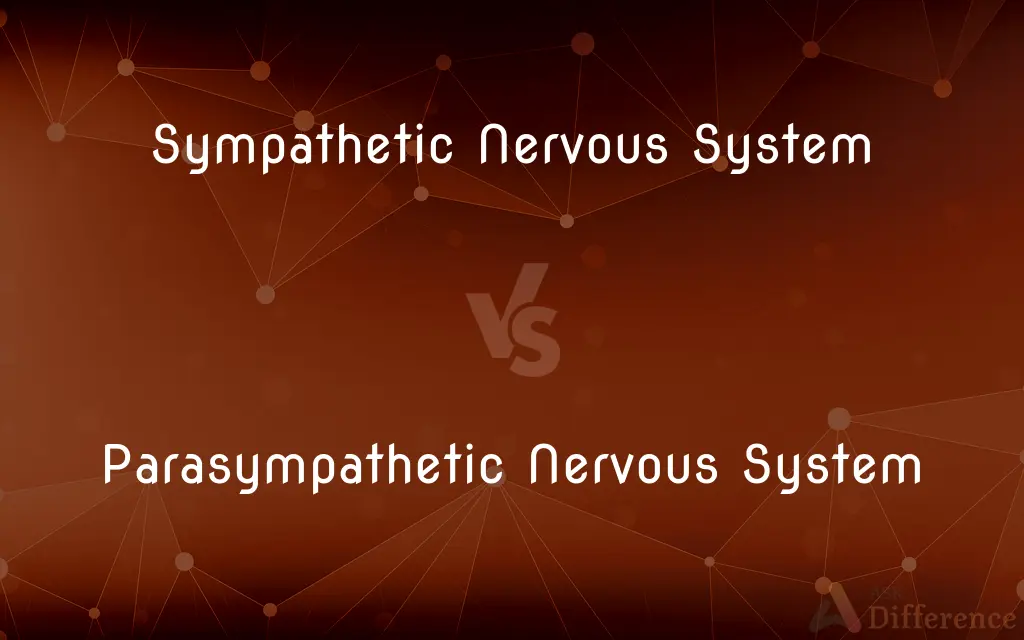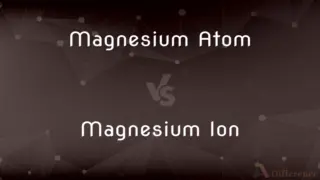Sympathetic Nervous System vs. Parasympathetic Nervous System — What's the Difference?
By Tayyaba Rehman — Published on January 18, 2024
The Sympathetic Nervous System activates the body’s fight-or-flight response; the Parasympathetic Nervous System promotes rest and digestion.

Difference Between Sympathetic Nervous System and Parasympathetic Nervous System
Table of Contents
ADVERTISEMENT
Key Differences
The Sympathetic Nervous System (SNS) is often referred to as the body's "fight or flight" mechanism. It prepares the body for action, increasing heart rate and blood pressure, and mobilizing energy stores.
The Parasympathetic Nervous System (PNS), in contrast, is responsible for the "rest and digest" functions. It slows down the heart rate, decreases blood pressure, and stimulates digestion and waste elimination.
The SNS uses neurotransmitters like norepinephrine to stimulate bodily responses, leading to an increased state of alertness and readiness for physical activity.
Conversely, the PNS primarily utilizes the neurotransmitter acetylcholine to induce calming and restorative processes in the body, promoting relaxation and healing.
While the SNS gears the body up for emergencies or physical exertion, the PNS helps to conserve energy and maintain long-term health through relaxation and nourishment.
ADVERTISEMENT
Comparison Chart
Primary Function
Activates fight-or-flight response.
Promotes rest and digestion.
Effect on Heart Rate
Increases heart rate.
Decreases heart rate.
Effect on Blood Pressure
Raises blood pressure.
Lowers blood pressure.
Neurotransmitter
Uses norepinephrine.
Uses acetylcholine.
Energy State
Mobilizes energy stores.
Conserves energy.
Compare with Definitions
Sympathetic Nervous System
Prepares body for physical activity.
The Sympathetic Nervous System primes muscles for action.
Parasympathetic Nervous System
Uses acetylcholine as a neurotransmitter.
Acetylcholine is key in the Parasympathetic Nervous System.
Sympathetic Nervous System
Mobilizes body's energy stores.
During stress, the Sympathetic Nervous System activates energy release.
Parasympathetic Nervous System
Induces calming processes.
The Parasympathetic Nervous System reduces stress responses.
Sympathetic Nervous System
Activates fight-or-flight response.
The Sympathetic Nervous System kicked in during the emergency.
Parasympathetic Nervous System
Conserves body's energy.
Sleep is governed by the Parasympathetic Nervous System.
Sympathetic Nervous System
Increases heart rate and blood pressure.
Exercise stimulates the Sympathetic Nervous System.
Parasympathetic Nervous System
Decreases heart rate.
Relaxation activates the Parasympathetic Nervous System.
Sympathetic Nervous System
Uses norepinephrine as a neurotransmitter.
Norepinephrine is released by the Sympathetic Nervous System.
Parasympathetic Nervous System
Promotes rest and digestion.
After eating, the Parasympathetic Nervous System aids digestion.
Common Curiosities
Is the Sympathetic Nervous System always active?
No, it activates primarily during stress or physical exertion.
What triggers the Parasympathetic Nervous System?
Relaxation, eating, and a calming environment activate it.
Can the Parasympathetic Nervous System reduce stress?
Yes, its activation promotes relaxation and stress reduction.
What happens when the Sympathetic Nervous System is activated?
Heart rate and blood pressure increase, and energy is mobilized.
Can the Sympathetic Nervous System affect digestion?
Yes, it can slow down digestion during its activation.
What neurotransmitter is associated with the Sympathetic Nervous System?
Norepinephrine is the primary neurotransmitter.
How does the Sympathetic Nervous System affect the eyes?
It can dilate pupils and enhance peripheral vision.
What triggers the Sympathetic Nervous System?
Stress, fear, and physical activity can activate the Sympathetic Nervous System.
How does the Parasympathetic Nervous System affect the eyes?
It can constrict pupils and focus on near objects.
Is the Parasympathetic Nervous System active during sleep?
Yes, it plays a significant role during sleep.
Can lifestyle choices influence these nervous systems?
Yes, stress management and relaxation techniques can influence their activities.
What happens when the Parasympathetic Nervous System is active?
Heart rate decreases, digestion is stimulated, and the body conserves energy.
Can the Sympathetic and Parasympathetic Nervous Systems operate simultaneously?
They usually work in opposition, but can have coordinated responses.
What neurotransmitter is associated with the Parasympathetic Nervous System?
Acetylcholine is the primary neurotransmitter.
Are these systems part of the central nervous system?
No, they are part of the autonomic nervous system, which is a division of the peripheral nervous system.
Share Your Discovery

Previous Comparison
Magnesium Atom vs. Magnesium Ion
Next Comparison
Molds vs. YeastAuthor Spotlight
Written by
Tayyaba RehmanTayyaba Rehman is a distinguished writer, currently serving as a primary contributor to askdifference.com. As a researcher in semantics and etymology, Tayyaba's passion for the complexity of languages and their distinctions has found a perfect home on the platform. Tayyaba delves into the intricacies of language, distinguishing between commonly confused words and phrases, thereby providing clarity for readers worldwide.













































